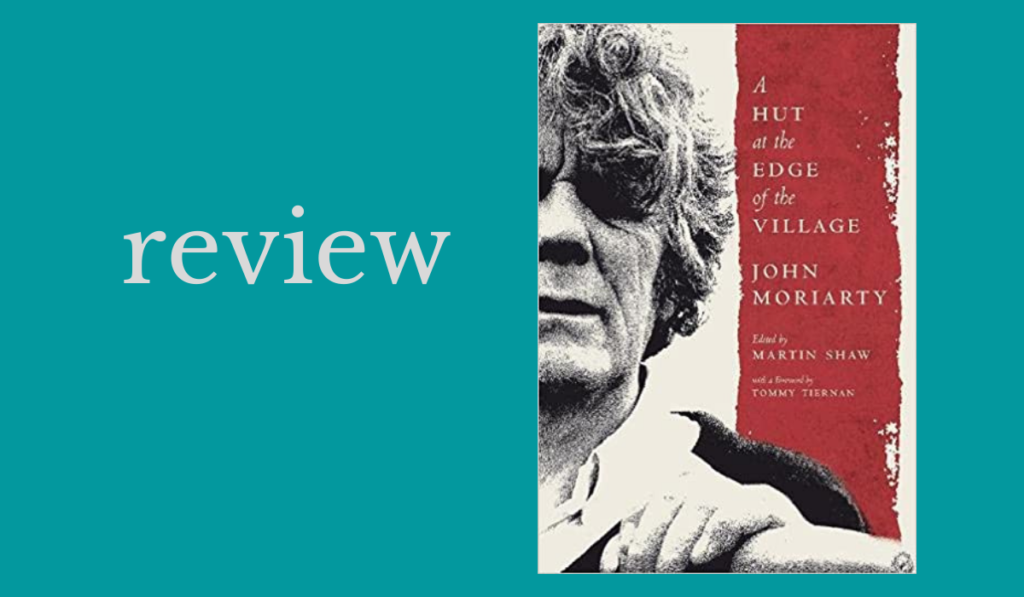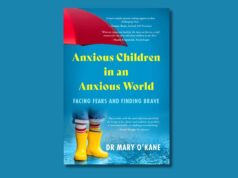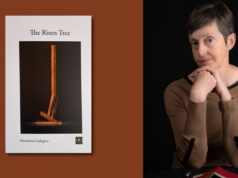
A Hut at the Edge of the Village|John Moriarty|ed. Martin Shaw|Lilliput Press|ISBN:9781843518006|€15.00
by Réamonn Ó Ciaráin
The Lilliput Press in revealing their latest John Moriarty offering are initiating a commemoration and a celebration, a literary procession of sorts.
Leading the way is reflective comedian, show host and already Irish elder, Tommy Tiernan, who delivers a personal and meaningful foreword. Then comes the book’s editor, Martin Shaw, from Devon, a mythologist and story-telling teacher, with his insightful introduction. The devotees and initiates are then called on to enter A Hut at the Edge of the Village where John Moriarty, the hierophant of North Kerry, will hold court.
Tommy Tiernan encourages us to surrender and let the stories lead the way. Moriarty is holding our hand anyway, he writes, guiding us on our way and there is no harm in that, for even Tiernan accepts that this reading is demanding. An early adopter of Moriarty’s wisdom, Tiernan returns regularly to source for replenishment.
Martin Shaw is a kindred spirit of the late John Moriarty no doubt. They are like philosophical twins and a true case of Aithníonn ciaróg ciaróg eile. The selections for this beautiful publication were made wisely. Some excerpts are mythic and others are modern by comparison. Some of the ideas contained in this compendium are in fact so ancient as to be survivors of the very ‘dispersals of Babel’. They all stitch together trimly as though of the one bolt of cloth which of course they are not. But the patterns certainly match.
This thematic trawl of Moriarty’s extensive body of work has been generous in its returns. One reason for this consistency has been identified by Shaw. He writes, ‘The power of the message is that Moriarty has found a thousand different ways to say something disturbing: We have to change our lives.’
Dreaming features one way or another under every thematic heading. Moriarty wanted to ‘inherit and inhabit’ his dreams and, should we too want the same, neither logic nor rationality can stand in our way.
Martin Shaw is a guide par excellence for these alternative realms in Moriarty’s writing. In a world polluted by conformity of thought, John Moriarty is saying to the reader that it is fine if ‘the random is on you’. With each subsequent passage we step on to another one of John Moriarty’s fóidíní mearaí, his stray sods. These fóidíní could well prove to be, as Moriarty writes, ‘… soul to someone who came here having no soul at all,’ in our unsteadying world. One could end up in Tír na nÓg where three days are equivalent to three hundred years, and where we find ‘fantasy floating free from fact’. Such is the nature of Moriarty’s intricate and fine web of thought.
In life Moriarty experienced serious mental anguish. He was like those lapwings he described, ‘battered by hailstones’.
Shaw explains that ‘Deep information usually arrives with dismay.’ There is still an urgency in Moriarty’s writing though he died in 2007. The urgency is for reform, for ecological evolution, lest we ‘sicken further’ in our dismay.
To help with our dismay, Moriarty retrieves an ancient way of knowing from the medieval Irish language literary tradition. He calls this Silver Branch Perception. It is a way of seeing every bush as a burning bush. ‘…another than the scientific way of knowing the universe’, Moriarty writes. Silver Branch Perception or beholding as Martin Shaw calls it, comes from the Voyage of Bran and is a way that is actually seeking us as much as we might be seeking it. We must allow ourselves to be found though, in silence, in solitude and in other than scientific places, for the scientific absolutes will take us only so far. Silver Branch Perception, writes Moriarty, is a ‘finer truth about the universe than E = mc2’.
By becoming like the Hard Man Moriarty writes of, we can remedy our ecological dismay. One day the Hard Man sets his hounds tearing after a heavy looking hare. They quickly catch up and rip her to pieces. The Hard Man arrives at the scene only to find the hare’s babies laid bare on the grass but alive. This brings the Hard Man to a softening. Gathering them up and bringing them home he nurses the dead hare’s babies and never hunts again. A parable for sure, it speaks to all of us who are in need of softening, in one way or another. It is with unforgettable and deeply meaningful stories like this that Moriarty reveals himself as the exceptional seanchaí he is. His stories set off echoes within us.
Place, both ordinary and extraordinary, is an important feature in Moriarty’s thinking.
According to Martin Shaw his place is very often his psyche. Moriarty wants us to ‘commit to the luminosity of the ordinary’. One such commonplace luminosity is the caterpillar-butterfly miracle to which he has returned again and again in his writing. With the memory of Mary Ann Danny O’, his neighbour, Moriarty conjures up his childhood homeplace powerfully. In all her white headed eighties we encounter this spinster ‘cranning forward in her doorway’ after the blackguarding boys had tormented her by pounding her doors, front and back, with their fists. It is a memory of a time and a place long gone. It brings Moriarty to reflect; ‘To this day I’ve seen nothing that so questions the right of the universe to exist, as it exists.’ Here he captures the forlornness of Mary Ann Danny O’ in an achingly beautiful way.
Tuaim Beola, on the banks of the Owenmore River in Connemara, where Moriarty spent many years, was for him a very special place. It was an intriguing place. You couldn’t, for instance, he tells us, automatically assume that it was a human that was knocking on your door. It could as easily have been a spirit for example or a Bean Sidhe, a Pouca, Christ himself or the Angel Gabriel only. Moriarty’s sense of place is intense and mystical. This is true whether he’s writing about Moyvane, London, Torc Mountain or the Grand Canyon.
The perception with which he conveys his surroundings is truly extraordinary and beyond the constraints of the factual.
The language here is also astonishing or a-stone-ish-ing as Moriarty would parse. With him, ordinary words can sometimes deliver us to extraordinary places. Referring to the mythic Magh Meall, an Irish equivalent to Plato’s Atlantis, he writes, ‘All summer long all elsewheres were where we were’. He is at home in such places for he is in his very own and very real mundus imaginalis.
His ear for dialogue is acute. Thinking of his Connemara anamchara, Martin Halloran’s turn of phrase, Moriarty writes, ‘… even the excretions were a form of affection’. Everyday occurrences that might pass over others lodge meaningfully in Moriarty’s mind. On Martin Halloran’s relationship with his dog, Rover, Moriarty writes ‘…it was as a couple on precarious good terms with each other, or maybe not, that they’d come through my door.’ We might ask, for that matter, is there a human couple who can not relate to being on precarious good terms with each other or maybe not from time to time?
As well as being profound, Moriarty was humorous and brought much local colour to his writing.
He could spin a yarn in a pub but also engage in deep discourse with the likes of Darwin or Descartes with whom he had elemental differences. He was a latter-day mystic who drew greatly from other mystics; John of the Cross, Ekart, Saint Ciarán of Saighir, Neitchze and the Psalmists. One potent message Moriarty has for his readers is, that we do not have to travel east in search of finer esoteric wisdom. We needn’t leave home for the treasure we hunt is buried under the flagstone at our front door. We pass over it daily.
We take sips from a fathomless reservoir in this publication for it is a portable compendium of essential Moriarty. That really is saying something for Martin Shaw’s most difficult task, in all probability, was deciding what not to include. Once more The Lilliput Press, his mainstay publisher, is showing the loyalty to John Moriarty they showed him when he was alive. This is a book of thoughts which will sate a hunger many do not yet realise they have. It will reward all who spend the necessary time with John Moriarty in A Hut at the Edge of the Village.
Waiting in the hut is Martin Halloran and he is calling once more for that hoor of a Kerryman, John Moriarty. And once more he declares, ‘The coldesht day in winter, John, and the warmesht day in summer’. ‘My besht friend ever.’ ‘No use hangn a man without a head, John. No use hangn a man without a head.’
Réamonn Ó Ciaráin is from South Armagh, he is Director of Education with Gael Linn and author of three books on Cú Chulainn.












